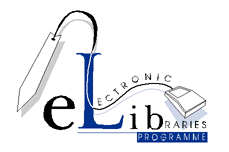
Music Libraries Online
- Project web site
- http://www.musiconline.ac.uk
- Programme area
- Clumps
- Contact details
Marian Hogg, Project Administrator
Trinity College of Music, 10 - 11 Bulstrode Place, London W1M 5FW
email: mlo@tcm.ac.uk
tel: 0171 487 5748
fax: 0171 486 6018
Ms Katharine Hogg, Music Libraries Consultant
10 Byron Road, Reading RG6 1EP
email: khogg@dircon.co.uk, phone: 0118 935 2318
Mr Matthew Dovey, Technical Consultant
Libraries Automation Service
Oxford University, 65 St. Giles, Oxford, OX1 3LU
email: matthew.dovey@las.ox.ac.uk, phone: 01865 278 272, fax: 01865 278
175
Ms Kate Sloss, Project Director
Trinity College of Music, 10 - 11 Bulstrode Place, London W1M 5FW
phone: 0171 487 9627, fax: 0171 486 6018
email: ksloss@tcm.ac.uk
Project description
as of July 29 1998
Introduction
As part of the Joint Information Systems Committee (JISC) Electronic Libraries Programme, a consortium of music conservatoire libraries has been awarded a grant to pilot the application of the Z39.50 retrieval protocol to the networking of library catalogues into subject clumps. The Music Libraries Online project will create a virtual union catalogue for music on the world wide web, enabling anyone with access to the web to see the holdings of all the libraries in the consortium, with a single search. The project will address bibliographical, technical and management issues relating to access to subject-specific collections. The project is funded until 31 December 2000.
Description
Music libraries face unique challenges in meeting users' needs. Music may be required in any of a wide range of formats - the same work may exist and fulfil different study needs as a full or vocal score, as a sound recording or video. Printed music is used not only for study purposes but also for live performance, which makes easy access to and speedy delivery of a particular score (and perhaps a complete set of parts) of critical importance. Together, the nine conservatoire libraries hold an incomparable set of scholarly resources for musicians; with access to the combined set of holdings through a virtual clump, they will be able to provide facilities on a scale which they are unable to support individually. In addition to the availability of the library catalogues, the project hopes to facilitate a highly efficient interlending system and to co-ordinate acquisitions policies. Several of the participating libraries have also been cataloguing special collections materials under the HEFCE Non-Formula Funding (NFF) initiative and enhanced access to these records will be of interest not only to scholars in the UK but world-wide.
The Steering Group
The Steering Group will play a very active role. This group comprises senior librarians from the nine music colleges, with representation from the Performing Arts Data Service, EARL consortium for public library networking, university music department libraries and Fretwell Downing. One of the project's early priorities is to agree a common standard among the nine libraries for bibliographic description. Music libraries are (out of necessity) not noted for faithful and devoted adherence to standard cataloguing systems. The bibliographic standards working group is addressing this problematic area.
The considerable diversity among the current library systems provides scope for testing the compatibility of new-generation Z39.50 compliant systems such as Unicorn with much larger systems based on older software and holding shared catalogue data.
Partners
Membership of Music Libraries Online will comprise two categories. Primary partners are the nine UK conservatoire libraries:
- Birmingham Conservatoire
- Guildhall School of Music and Drama
- Leeds College of Music
- Royal Academy of Music Royal College of Music
- Royal Northern College of Music
- Royal Scottish Academy of Music and Drama
- Trinity College of Music
- Welsh College of Music and Drama
Secondary partners will be drawn from other sectors, including public libraries, university music libraries, national libraries and composer archives. The project will seek to recruit seven secondary partners within the funded period of January 1998 to December 2000 and expansion beyond this number will be considered as part of the exit strategy.
Background
Many of the recommendations of the Follett Report related to ways in which the use of information technology in the electronic library can help to alleviate some of the problems of university libraries today. The Joint Information Systems Committee (JISC) established the Electronic Libraries Programme (eLib) as a direct response to the Follett Report. The Programme was initially awarded a budget of about [sterling]15 million over 3 years, and its objectives included the use of IT to improve delivery of information through increased use of electronic library services, to allow academic libraries to cope better with growth, to explore different models of intellectual property management and to encourage new methods of scholarly publishing.
In the third phase with a budget of [sterling]5 million over 3 years, eLib is funding integration projects to build exemplar hybrid libraries which will provide access to both digital and non-digital materials, including several Z39.50 pilot projects to link library catalogues. Phase 3 will also directly address issues of concern for the long-term preservation and access to digital resources. Several early eLib projects have received extension funding in order to ensure that the maximum benefit has been drawn from the Programme's initial phases.
This is one of the successful projects in the Large Scale Resource Discovery (`Clumps') Programme Area.

